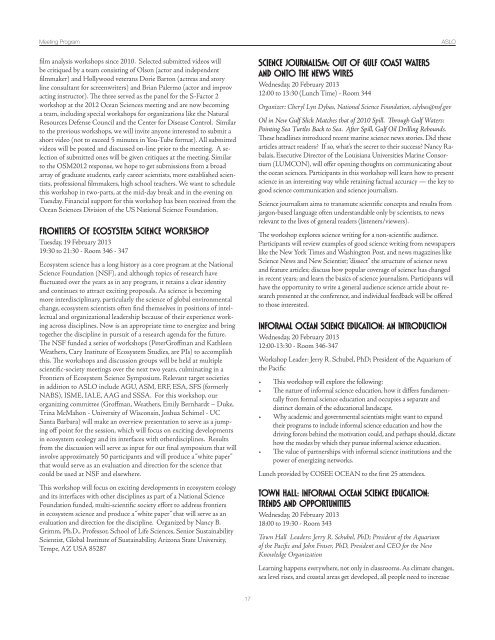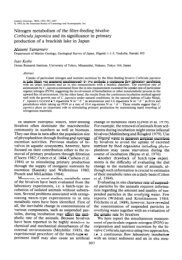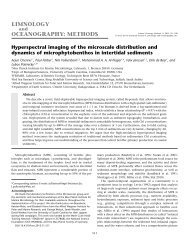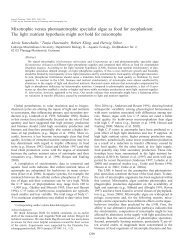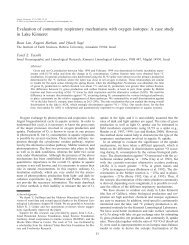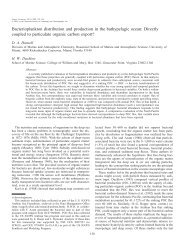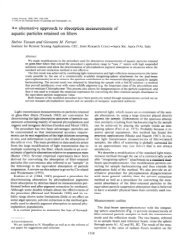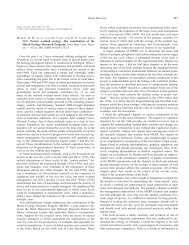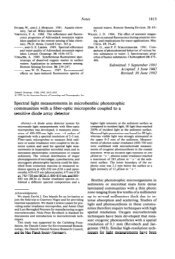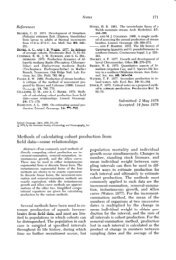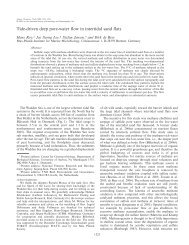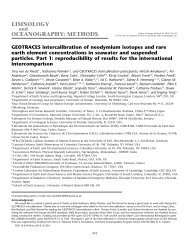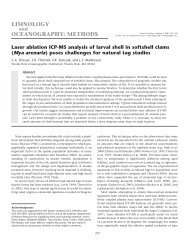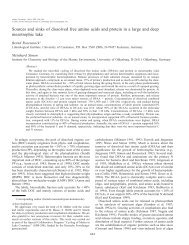CONFERENCE PROGRAM - ASLO
CONFERENCE PROGRAM - ASLO
CONFERENCE PROGRAM - ASLO
You also want an ePaper? Increase the reach of your titles
YUMPU automatically turns print PDFs into web optimized ePapers that Google loves.
Meeting Program<br />
film analysis workshops since 2010. Selected submitted videos will<br />
be critiqued by a team consisting of Olson (actor and independent<br />
filmmaker) and Hollywood veterans Dorie Barton (actress and story<br />
line consultant for screenwriters) and Brian Palermo (actor and improv<br />
acting instructor). The three served as the panel for the S-Factor 2<br />
workshop at the 2012 Ocean Sciences meeting and are now becoming<br />
a team, including special workshops for organizations like the Natural<br />
Resources Defense Council and the Center for Disease Control. Similar<br />
to the previous workshops, we will invite anyone interested to submit a<br />
short video (not to exceed 5 minutes in You-Tube format). All submitted<br />
videos will be posted and discussed on-line prior to the meeting. A selection<br />
of submitted ones will be given critiques at the meeting. Similar<br />
to the OSM2012 response, we hope to get submissions from a broad<br />
array of graduate students, early career scientists, more established scientists,<br />
professional filmmakers, high school teachers. We want to schedule<br />
this workshop in two-parts, at the mid-day break and in the evening on<br />
Tuesday. Financial support for this workshop has been received from the<br />
Ocean Sciences Division of the US National Science Foundation.<br />
FRONTIERS OF ECOSYSTEM SCIENCE WORKSHOP<br />
Tuesday, 19 February 2013<br />
19:30 to 21:30 - Room 346 - 347<br />
Ecosystem science has a long history as a core program at the National<br />
Science Foundation (NSF), and although topics of research have<br />
fluctuated over the years as in any program, it retains a clear identity<br />
and continues to attract exciting proposals. As science is becoming<br />
more interdisciplinary, particularly the science of global environmental<br />
change, ecosystem scientists often find themselves in positions of intellectual<br />
and organizational leadership because of their experience working<br />
across disciplines. Now is an appropriate time to energize and bring<br />
together the discipline in pursuit of a research agenda for the future.<br />
The NSF funded a series of workshops (PeterGroffman and Kathleen<br />
Weathers, Cary Institute of Ecosystem Studies, are PIs) to accomplish<br />
this. The workshops and discussion groups will be held at multiple<br />
scientific-society meetings over the next two years, culminating in a<br />
Frontiers of Ecosystem Science Symposium. Relevant target societies<br />
in addition to <strong>ASLO</strong> include AGU, ASM, ERF, ESA, SFS (formerly<br />
NABS), ISME, IALE, AAG and SSSA. For this workshop, our<br />
organizing committee (Groffman, Weathers, Emily Bernhardt – Duke,<br />
Trina McMahon - University of Wisconsin, Joshua Schimel - UC<br />
Santa Barbara) will make an overview presentation to serve as a jumping<br />
off point for the session, which will focus on exciting developments<br />
in ecosystem ecology and its interfaces with otherdisciplines. Results<br />
from the discussion will serve as input for our final symposium that will<br />
involve approximately 50 participants and will produce a “white paper”<br />
that would serve as an evaluation and direction for the science that<br />
could be used at NSF and elsewhere.<br />
This workshop will focus on exciting developments in ecosystem ecology<br />
and its interfaces with other disciplines as part of a National Science<br />
Foundation funded, multi-scientific society effort to address frontiers<br />
in ecosystem science and produce a “white paper” that will serve as an<br />
evaluation and direction for the discipline. Organized by Nancy B.<br />
Grimm, Ph.D., Professor, School of Life Sciences, Senior Sustainability<br />
Scientist, Global Institute of Sustainability, Arizona State University,<br />
Tempe, AZ USA 85287<br />
17<br />
SCIENCE JOURNALISM: OUT OF GULF COAST WATERS<br />
AND ONTO THE NEWS WIRES<br />
Wednesday, 20 February 2013<br />
12:00 to 13:30 (Lunch Time) - Room 344<br />
<strong>ASLO</strong><br />
Organizer: Cheryl Lyn Dybas, National Science Foundation, cdybas@nsf.gov<br />
Oil in New Gulf Slick Matches that of 2010 Spill. Through Gulf Waters:<br />
Pointing Sea Turtles Back to Sea. After Spill, Gulf Oil Drilling Rebounds.<br />
These headlines introduced recent marine science news stories. Did these<br />
articles attract readers? If so, what’s the secret to their success? Nancy Rabalais,<br />
Executive Director of the Louisiana Universities Marine Consortium<br />
(LUMCON), will offer opening thoughts on communicating about<br />
the ocean sciences. Participants in this workshop will learn how to present<br />
science in an interesting way while retaining factual accuracy — the key to<br />
good science communication and science journalism.<br />
Science journalism aims to transmute scientific concepts and results from<br />
jargon-based language often understandable only by scientists, to news<br />
relevant to the lives of general readers (listeners/viewers).<br />
The workshop explores science writing for a non-scientific audience.<br />
Participants will review examples of good science writing from newspapers<br />
like the New York Times and Washington Post, and news magazines like<br />
Science News and New Scientist; “dissect” the structure of science news<br />
and feature articles; discuss how popular coverage of science has changed<br />
in recent years; and learn the basics of science journalism. Participants will<br />
have the opportunity to write a general audience science article about research<br />
presented at the conference, and individual feedback will be offered<br />
to those interested.<br />
INFORMAL OCEAN SCIENCE EDUCATION: AN INTRODUCTION<br />
Wednesday, 20 February 2013<br />
12:00-13:30 - Room 346-347<br />
Workshop Leader: Jerry R. Schubel, PhD; President of the Aquarium of<br />
the Pacific<br />
• This workshop will explore the following:<br />
• The nature of informal science education, how it differs fundamentally<br />
from formal science education and occupies a separate and<br />
distinct domain of the educational landscape.<br />
• Why academic and governmental scientists might want to expand<br />
their programs to include informal science education and how the<br />
driving forces behind the motivation could, and perhaps should, dictate<br />
how the modes by which they pursue informal science education.<br />
• The value of partnerships with informal science institutions and the<br />
power of energizing networks.<br />
Lunch provided by COSEE OCEAN to the first 25 attendees.<br />
TOWN HALL: INFORMAL OCEAN SCIENCE EDUCATION:<br />
TRENDS AND OPPORTUNITIES<br />
Wednesday, 20 February 2013<br />
18:00 to 19:30 - Room 343<br />
Town Hall Leaders: Jerry R. Schubel, PhD; President of the Aquarium<br />
of the Pacific and John Fraser, PhD, President and CEO for the New<br />
Knowledge Organization<br />
Learning happens everywhere, not only in classrooms. As climate changes,<br />
sea level rises, and coastal areas get developed, all people need to increase


